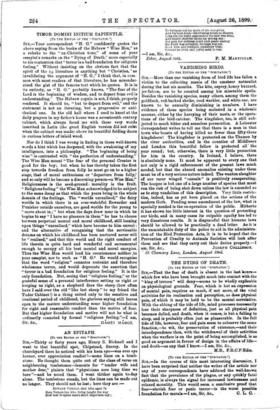THE DYING OF DEATH.
[To THE EDITOR OF THE "SPECTATOR."]
SIR,—That the fear of death is absent in the last hours— which few who have been brought much into contact with the " king of terrors " will deny—seems to be wholly explicable on physiological grounds. Fear, which is but an expression of mental pain, requires as much, if not more, of the vital activities for its realisation and perception, as does physical pain, of which it may be held to be the mental correlative. With the ebbing of the tide of life, mind processes necessarily lose their sharpness of definition, just as all physical pain becomes dulled, and death, when it comes, is but a falling to sleep, and is probably often just as pleasurable. In the full tide of life, however, fear and pain seem to subserve the same function,—to wit, the preservation of existence,—and their interdependence then, with the withdrawal of their activities when the warfare is on the point of being accomplished, is as good an argument in favour of design in the affairs of life— and death—as any that I know.—I am, Sir, &c.,
M.B., F.R.C.P:Edin.


































 Previous page
Previous page